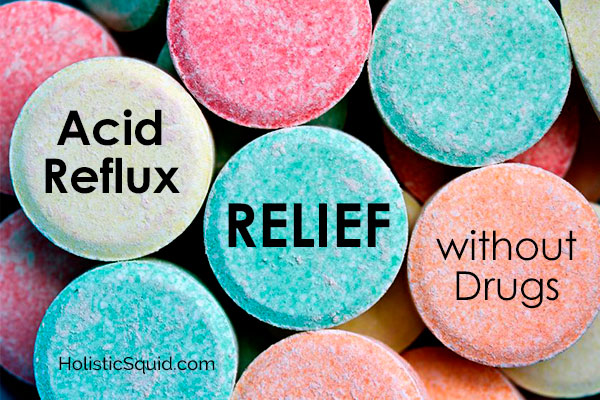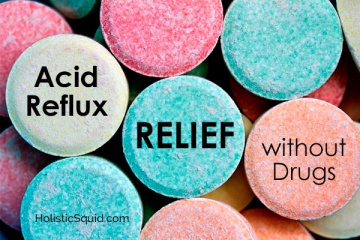
Seems like everyone's talking about gut healing lately, yet so many folks I meet are still popping pills left and right in search of acid reflux relief. Oftentimes stress is one of the main factors with this condition, but there are also many natural remedies to address the symptoms too. In this post, Jennifer shares what's worked for her. ~Emily
People are told by advertisers to “ask their doctor for the purple pill” for heartburn and acid reflux problems. Yet they are not being told that this is not the best way to solve their digestive issues or what can happen when they take a pill like Nexium or Zantac for months and years.
The problem with conventional methods for acid reflux relief
Conventional understanding of acid reflux is that there is too much acid in the stomach and so the amount of acid must be reduced to deal with the problem.
Millions of Americans are on medication for acid reflux. Beyond the antacids like Tums, conventional treatments include proton pump inhibitors (PPI) like Nexium and other drugs. PPI's were only approved by the FDA for 8 weeks of use, but are often used for much longer. Side effects can include increased fracture risk, reduced magnesium levels, and bacterial overgrowth leading to diarrhea.
But did you know that acid reflux is actually an indication of not enough stomach acid (low pH) rather than too much?
Using drugs to reduce stomach acid production can further impair the effectiveness of digestion and contribute to the cause of acid reflux. Low stomach acid can also lead to bacterial overgrowth which is another cause of acid reflux.
The other key factor in acid reflux is a weakened esophageal sphincter (the barrier between the stomach and the esophagus.) Poor digestion will lead to increased gas and pressure on that sphincter and reflux of the digestive juices.
How to get acid reflux relief without drugs
Restore gut health
Healing your digestion is essential to getting lasting acid reflux relief.
A great place to start is removal of gluten and possibly dairy and grains from your diet and determine if you see a difference. Removing gluten has been one of the most effective interventions for me in dealing with my own acid reflux.
Adding in probiotics and probiotic foods and drinks can make a difference as well, because they will increase the beneficial gut bacteria, thus improving digestion and cutting back on acid reflux. When the overgrowth of pathogenic bacteria is addressed by the growth of beneficial bacteria present in the probiotics, the gut is able to heal.
Read more about how to get started with a gut healing diet in this post.
Water with meals is also a problem because it dilutes the acid in the stomach. This contributes then to the problem of too low of a stomach acid. Drink your water apart from your meal.
Take enzymes with HCl at each meal
Enzymes help breakdown the food in the digestion process, which improves digestion to help with preventing reflux. Try a blend of different enzymes just before a meal or immediately after. Not everyone will be helped by enzymes, as they may not be enough to fix the cause of the problem.
HCl (hydrochloric acid) will acidify the stomach juices – thereby helping to correct the low acid that is often a cause of reflux. Start with 1 capsule at the start of the meal and gradually increase the dose every few days until a burning is felt in the throat. When this happens then the dose needs to be decreased to just below where that burning sensation was felt. (source)
HCl should always be taken with pepsin or an acid stable protease, (protein digesting enzyme) because if acid is low, protein digesting enzymes are likely also low in the stomach. Do NOT take HCl along with any anti-inflammatory medication (like Ipuprofen, Motrin, or corticosteroids) as this can damage stomach lining. (source)
Try a digestive tonic
There are several different tonics that can be help to those suffering acid reflux. You do not need to use all of these – instead choose the one that is most helpful to you in your situation.
Bitters
Bitters are selected herbs that have been used to treat digestive issues for many years, and more popularly known for flavoring alcoholic cocktails. The bitter taste on the tongue stimulates the flow of digestive juices and enzymes, thus improving digestion and reducing reflux. They also help to raise the acid levels in the stomach.
Bitters include barberry bark, caraway, chamomile, dandelion, fennel, gentian root, ginger, globe artichoke, goldenseal root, hops, milk thistle, slippery elm, peppermint, rue, wormwood, and yellow dock. A study done in Germany found that gentian root significantly reduced many GI symptoms, including acid reflux. (source)
Bitters can be purchased or made into a tincture, used as a tea, or a decoction. Bitter greens like dandelion, fennel, and yellow dock can be added to salads.
Bitters should be taken 10-15 minutes before a meal for optimal effect. The bitter taste gets the salivary glands working, so it is important that bitters are taken in a way that they can be tasted (thus not in a pill form). This then signals the rest of the digestive tract to begin to prepare for food. They can also be used for an acute problem after a meal.
If pregnant or nursing, chamomile bitters are safe for use. Bitters are generally safe for children over age 2, but the amount needs to be adjusted for their weight. Divide the child's weight in lbs by the normal adult size of 150 lbs to get the recommended dose for the child. (source)
Emily loves this organic, handcrafted bitters.
Apple cider vinegar
Apple cider vinegar is a wonderful remedy for many ailments. Although there have not been medical studies done on the use of apple cider vinegar for acid reflux relief, there are many anecdotal stories of it helping. The vinegar is very acidic and as a result helps to add acid to the stomach upon ingestion.
Apple cider vinegar is best taken diluted with 1-2 tbsp in 8 ounces of water. Drink before meals and when heartburn happens.
Aloe vera juice
Aloe vera juice is a mild treatment that can be taken 1/4 cup 1-3x/day especially if heart burn is happening. Aloe vera juice works because it works toward balancing the acid/alkaline environment of the digestive system. It also helps reduce the fermentation of yeast in the gut. Since yeast fermentation can increase the pressure on the abdomen and thus cause acid reflux, reducing the fermentation will lower that pressure. (source)
Real ginger
Ginger root is healing medicine that can be helpful for digestive issues. It reduces inflammation in the digestive tract, regulate the flow of digestive juices, and keeps the digestive tract moving which prevents stagnation and leads to less reflux. It has certain phenols which relax the stomach muscles and also aid with digestion.
A cup of tea daily will be helpful in treating acid reflux. Ginger can also be grated and eaten plain or used in cooking.
Use peppermint, fennel & ginger essential oil
I've had success getting acid reflux relief using a blend of peppermint, fennel, and ginger essential oils.
To try this, mix two drops each of peppermint, fennel, and ginger in two tablespoons of a carrier oil like almond oil or coconut oil. Rub it on your chest in the area of your esophagus and throat. Because of the concentration of the plant oils, I do not recommend using oils internally without the supervision of a trusted health professional.
While other helpful natural remedies for acid reflux relief exist, the methods above have worked great for me. I encourage you to find alternatives to the conventional treatments, which only treat symptoms and not causes – often at further risk to your health. By healing the causes of acid reflux you will find real, lasting relief.
Does someone your know need acid reflux relief?
Share this post!
Jennifer is a happily married homeschooling mother of 4 who lives in a small town in Pennsylvania. She blogs at The Entwife's Journal and at Purposeful Nutrition. She is also an RN who is working to build a health business through blogging, speaking, and health coaching.











Thank you for this post! This information is very helpful & relevant for me, but I have a question I was wondering if you could answer: I have been taking digestive enzymes with meals for a few months, but I am also on Humira. In the post you say to avoid them if taking anti-inflammatory medication; would they interact negatively with Humira as well?
I realize this is very specific, and I do plan on asking my doctor, but I was just wondering if you happen to know! If not I do understand. Thank you!!
I am sorry but I really can’t comment on the effect of Humira on the enzymes. I recommend you ask your doctor. There are other options besides the digestive enzymes so perhaps it would be best for you to choose one of the other interventions as long as you are taking Humira.
Are there any brands of enzymes you recommend?
Thank you this post was so very helpful. i love your blog so much and just signed up to get your posts every time.
Thank you
Betsy
Visceral massage can make a big difference (I learned how to stretch my esophagus to pull my small to medium hiatal hernia back. And can now sleep on my right side for the first time in decades.)
This could be very helpful to a reader. Thank you for sharing. It is not something I was familiar with.
I’ve found that regular yellow mustard taken either right before a meal or within the first 15 minutes of reflux symptoms can stop it in its tracks. Usually a tablespoon is enough, but 2 can be taken if needed. Do not drink anything for 5 to 10 minutes after.
Please don’t take a tablespoonful of yellow English mustard as that would potentially blow your head off!